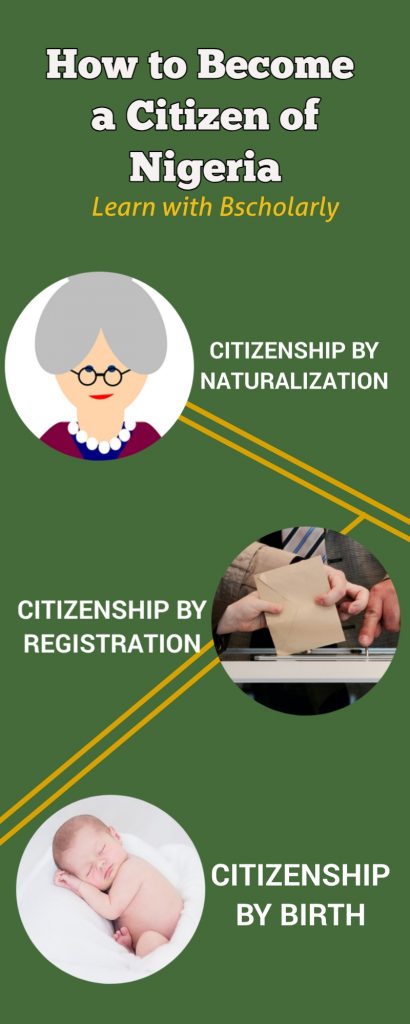Ways of acquiring citizenship in Nigeria: If you have been wondering how someone can become a citizen of Nigeria, this article is for you. As you already know, not every body in Nigeria is regarded as a citizen of the country. There are certain requirements that can make someone to become a citizen of Nigeria automatically. Today, i will be explaining those major ways of becoming a citizen of Nigeria. I enjoin you to read this work till the end because you are not going to regret it.

Also read:
- Differences between military and democratic government
- How to answer law problem questions using IRAC method
- Differences between rigid and flexible constitution
- Best commercial courses to study in the university
Being recognized as a citizen of a country is foremost part of one’s national identity. Governments worldwide equally recognize this and so provide laws governing this aspect of nationality. These laws are usually known as Nationality Law.
In Nigeria, the Constitution in the primary source on Nigerian Nationality Law. In its provisions, it stipulates those who are automatically regarded as citizens and for those who aren’t, ways they could become regarded as such.
What is citizenship?
Citizenship is the status of a person as recognized under the constitution of a country or a sovereign state as being a legal member of such country or state. It gives the person holding the citizenship access to all the benefits and rights stated in the constitution of such country.
3 Effective Ways of Acquiring Citizenship in Nigeria
There are three general ways of acquiring citizenship in Nigeria:
- By Birth;
- By Registration;
- By Naturalisation;
The provisions for obtaining Nigerian citizenship are stated in Chapter 3 of the Constitution of the Federal Republic of Nigeria 1999 known as the Nigerian Citizenship Act.

As we continue, the above ways of becoming a citizen of Nigeria will be explained with sections of the constitution to enable you understand better.
1. By Birth
Citizenship by birth is one of the most popular ways of acquiring citizenship in Nigeria. The provisions of section 25 of the Constitution covers the circumstances under which someone would be regarded as a citizen of Nigeria by birth and not require further processes.
Those who were born in Nigeria after the date of independence if their parents or any grandparents belong or belonged to an indigenous community. A person would still be regarded as a citizen by birth even if his parents and grandparents are no longer members of an indigenous community.
For those born outside Nigeria, one or both parents must be a citizen of Nigeria.
As you may know, Nigeria is a country with hundreds of tribes, communities and kingdoms, many of which existed in its territory even before the colonial amalgamation.
These communities are what are the term indigenous community refer to. It includes the major tribes of Igbo, Hausa and Yoruba as well as remote ones such as.
According to section 25 of the 1999 constitution of Nigeria, the following persons are citizens of Nigeria by birth:
- Every person born in Nigeria after the date of independence (October 1, 1960), either of whose parents or any of whose grandparents belongs or belonged to a community indigenous to Nigeria; Provided that a person shall not become a citizen of Nigeria by virtue of this section if neither of his parents nor any of his grandparents was born in Nigeria.
- Every person born outside Nigeria either of whose parents is a citizen of Nigeria.
- In this section, “the date of independence” means the 1st day of October 1960.
2. By Registration
Someone who can’t be regarded as a citizen by birth in Nigeria, can become a citizen by registration. This is largely try because, section 26 of the constitution of Nigeria provides the requirements for one to be eligible to begin the application process.
These conditions are outlined below:
- The applicant should be one of good character and this statement requires corroboration in form of a testimony by two people. One of these witnesses must be a religious minister.
- The applicant’s wish to be domiciled in Nigeria must be expressed and clearly shown.
- This applicant would have sworn the Oath of Allegiance to Nigeria (this oath is found in the Seventh Schedule to the Constitution)
- Application would be regarded as successful if the sitting President is satisfied that the applicant meets the above conditions.
There are two categories of people who can apply for citizenship by registration under this section:
- Women married to citizens of Nigeria. This also applies if the marriage is no longer in force.
- Anyone of full age and capacity born outside Nigeria with one or more grandparents that are citizens of Nigeria. If you recall, to be regarded as citizen by birth when one is born outside Nigeria, it is the citizenship of the parents that are considered.
Section 26 of the 1999 constitution of Nigeria reads as follows:
Subject to the provisions of section 28 of this Constitution, a person to whom the provisions of this section apply may be registered as a citizen of Nigeria, if the President is satisfied that –
He is a person of good character; two people to testify to that which one should a Religious minister…
He has shown a clear intention of his desire to be domiciled in Nigeria; and
He has taken the Oath of Allegiance prescribed in the Seventh Schedule to this Constitution.
The provisions of this section shall apply to any woman who is or has been married to a citizen of Nigeria or every person of full age and capacity born outside Nigeria any of whose grandparents is a citizen of Nigeria.
Also read: Reasons for the adoption of federalism in Nigeria
3. By Naturalization
Finally, one can become a citizen of Nigeria by naturalization. Naturalization is a way through which one can become a citizen of a country automatically by the law of that country. Usually, the law will provide that if the person has stayed for a certain number of years with good character, then he/she has become a citizen of the country.
So, if a person cannot apply to become a Nigerian citizen by registration, he/she can still apply to become a naturalized Nigerian citizen if he meets these requirements (provided in the 1999 constitution of Nigeria):
- The applicant must be of full age and capable of making useful contributions to the Nigerian society
- Just like applications for citizenship by Registration, the applicant must possess good character and should have shown a clear desire to be domiciled in the country.
- The applicant is also required to take the Oath of Allegiance in the Seventh Schedule to the Constitution
- The governor of the state where the person applying for citizenship wants to reside has to confirm the desire of the community to accept this person and would attest that the applicant is now familiar with Nigerian language andcustoms as practiced in that community.
- Also taken into consideration is the length of the applicant’s residence in Nigeria preceding the application date. There are two broad categories
- The applicant should have resided in Nigeria for a continuous period of fifteen years or;
- The applicant has resided in Nigeria continuously for a year and in a period of twenty years before has stayed for a periods amounting to fifteen years even if not continuous
- Application is successful if the President is satisfied of the above conditions
Subject to the provisions of section 28 of this Constitution, any person who is qualified in accordance with the provisions of this section may apply to the President for the same of a certificate of Naturalisation. The section provides as follows:
No person shall be qualified to apply for the grant of a certificate or naturalisation, unless he satisfies the President that –
He is a person of full age and capacity;
He is a person of good character;
He has shown a clear intention of his desire to be domiciled in Nigeria;
He is, in the opinion of the Governor of the State where he is or he proposes to be resident, acceptable to the local community in which he is to live permanently, and has been assimilated into the way of life of Nigerians in that part of the Federation;
He is a person who has made or is capable of making useful contribution to the advancement; progress and well-being of Nigeria;
He has taken the Oath of Allegiance prescribed in the Seventh Schedule to this Constitution; and
He has, immediately preceding the date of his application, either-
Resided in Nigeria for a continuous period of fifteen years; or
Resided in Nigeria continuously for a period of twelve months, and during the period of twenty years immediately preceding that period of twelve months has resided in Nigeria for periods amounting in the aggregate to not less than fifteen years.
Also see: Advantages and disadvantages of division of labour
Renunciation of Citizenship in Nigeria
Section 29 of the 1999 constitution of Nigeria provides that any Nigerian of full age who wishes to renounce his Nigerian citizenship shall make a declaration in a prescribed matter for the renunciation. However, the president may withhold such declaration, if it is made during war in which Nigeria is physically involved and if in his opinion it is contrary to public policy.
Deprivation of Citizenship in Nigeria
A person who is not a Nigerian by birth or registration may be deprived of his citizenship if the president is satisfied that the person has been sentenced to three years imprisonment within the period of seven years of which he is naturalized.
Any individual who is a citizen by registration or naturalization shall be deprived of his citizenship if he has shown himself by act of speech to be displayal to Nigeria or has, during any war, unlawfully traded with the enemy of Nigeria.
Also see: Most lucrative areas of law every law student should enrol into.
There are other methods of acquiring citizenship in a country especially in the old. The Head of State of a country could confer honorary citizenship to a foreigner who has made unlawful contributions to the state. Citizenship was acquired by conquest during Roman Times and Colonial period. In some countries citizenship can be acquired by honorary award to aliens who made marks in the development of the state.
In Nigeria, the president has the right to grant full residential rights to non-Nigerian spouses who do not wish to aquire Nigerian citizenship.
By way of conclusion, it is worthwhile to know that citizenship is an essential element in international relations. Citizenship play a part in membership of a state and in holding political office in the individuals that creates a sense of duty on the side of the sate and the individuals.

Edeh Samuel Chukwuemeka, ACMC, is a lawyer and a certified mediator/conciliator in Nigeria. He is also a developer with knowledge in various programming languages. Samuel is determined to leverage his skills in technology, SEO, and legal practice to revolutionize the legal profession worldwide by creating web and mobile applications that simplify legal research. Sam is also passionate about educating and providing valuable information to people.
What is the meaning of bajili